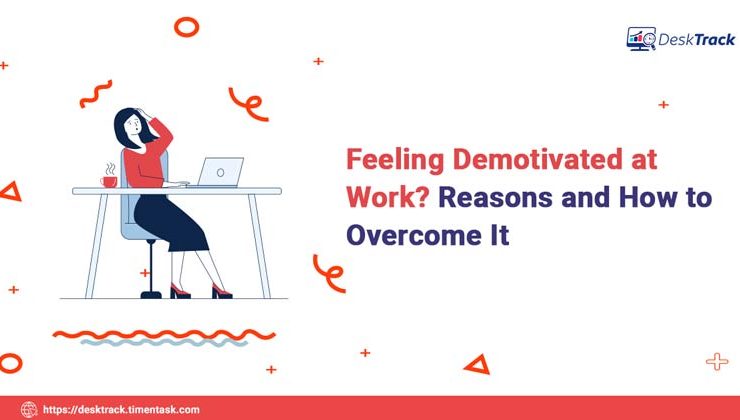
Everybody has experienced days at work where they lack motivation. Everyone experiences bad days, therefore it’s difficult, if not impossible, to consistently produce your finest work. This will lead to Feeling Demotivated at Work. There will undoubtedly be instances when you put off starting crucial undertakings for too long, lack focus, or both. At work, feeling demotivated and depressed can negatively impact productivity, limit creativity, and make each day seem to link an uphill battle.
In reality, our levels of motivation fluctuate throughout our lives depending on our present external circumstances, our professional conditions, and our physical and mental health. While “drive” performs an excellent job of advancing us during those motivated seasons, developing effective routines and processes as a sort of backup generator can truly help us when motivation wanes so that we can get through the lean weeks without halting progress toward our goals.
What is Demotivation and Why is it Important to Address It?
Feeling Demotivated and Depressed at work is the absence of a worker’s enthusiasm for or interest in their task. Employees who lack motivation are frequently disinterested in their work and may avoid completing assignments or interacting with others. The relationship between motivation—the desire to attain a goal or result—and demotivation is inverse.
To ensure high levels of engagement throughout your firm, paying close attention to what your employees need and responding to those needs is essential. Early detection and prompt intervention of demotivational symptoms can promote employee satisfaction and talent retention.
Common Reasons for Feeling Demotivated at Work:
The following reasons can lead to feeling demotivated at work:
1. Lack of Recognition and Appreciation
According to this study’s findings, a staggering 70% of workers believe that morale and motivation would significantly improve if supervisors took the time to express gratitude more frequently. Staff members may feel undervalued if you don’t take the time to let them know how much you respect their work. And let’s face it, feeling like your contribution isn’t appreciated is a near-certain recipe for complete feeling demotivated at work.
2. Boredom and Lack of Challenge
Employee boredom, also known as bore-out, is an increasing trend in the workplace and is recognized as a psychological disease that can result in burnout and illness. 43 percent of employees say they get bored at work, according to an Udemy study. According to the study, Millennials are nearly twice as likely to feel bored at work as other generations (48 percent of women report being bored at work compared to 39 percent of males).
3. Poor Work-Life Balance
An unhealthy work-life balance can seriously demotivate an employee, reducing their motivation to work and lowering their desire to continue carrying out their duties. Employees who lack motivation also tend to become distracted from their work, which increases the risk that they won’t be able to finish it on time.
4. Feeling Undervalued or Underpaid
No matter where you work, you add value for your employers and should be fairly compensated for the effort you put into your position. In order to have a pleasant work experience and continue to advance in your career, it’s critical to be proactive and discuss your concerns with your management if you feel underappreciated in your role.
5. Conflict with Colleagues or Management
Employee personality, goals, racial bias, and perspective differences can lead to workplace conflicts. While some workplace disputes are the result of poor management, others might arise from disagreements over how things should be done which may often cause feeling demotivated at work.
6. Lack of Opportunities for Growth and Development
Micromanagement is one of the main reasons for demotivation: Being overly meticulous about what each team member is doing and when would inevitably lead to dissatisfaction because it may be interpreted as a lack of confidence in the skills of others. Keep in mind that you hired personnel based on their abilities and skills; therefore, give them the freedom to accomplish their jobs and have faith in their competence.
Negative Consequences of Feeling Demotivated at Work:
1. Decreased Productivity
Feeling unmotivated at work is brought on by a variety of factors, including the existence of specific circumstances that lead to discontent and deter people from pursuing their goals. Insufficient motivation among employees sometimes results in insufficient effort, which lowers potential output.
2. Lower Job Satisfaction
Workers who are not emotionally invested in or committed to their employer become disengaged from their work. Reduced employee engagement indicates a worker won’t go above and beyond the call of duty to best serve the company.
3. Higher Turnover Rates
Workers who are not emotionally invested in or committed to their employer become disengaged from their work. Reduced employee engagement indicates a worker won’t go above and beyond the call of duty to best serve the company.
4. Negative Impact on Mental Health
The obvious signs of significant stress that workplace mental extremes could bring on include being in a bad mood. Getting into a lot of arguments with family members at home. Becoming increasingly vulnerable to situations that didn’t need any reaction, and consistently experiencing body aches and excessive headaches.
What to do When You Feel Demotivated?
Listed below are some strategies that can help you overcome when you feeling demotivated.
1. Setting Goals and Creating a Plan
It’s far too simple to underestimate how long a task will take or how much energy it will require. It can be difficult to determine which tasks are high priority and find time to work. Especially if your extensive task list and to-dos are dispersed among many apps and notes.
Making a “master list”—a single, comprehensive list that you frequently update with all of your tasks and obligations—can be a terrific method to keep track of everything that needs your attention. Organizing your chores according to priority, deadlines, and time estimations will make creating a successful weekly schedule much simpler.
2. Seeking Feedback and Recognition
An employee’s excellent work performance is formally acknowledged when they receive recognition at work. Typically, an employee receives this appreciation from their coworkers, manager, or department supervisor. Workplace appreciation can take many different forms, including an email of thanks, a comment made during a team meeting, or a business award.
Employees are inspired to keep producing their best work when they receive praise at work because it makes them feel valued for their contributions. Communication with your management frequently about your duties and performance at work is crucial. This can guarantee that your management is aware of the range of your contributions to the numerous jobs and projects.
3. Taking Breaks and Finding Ways to Recharge
Achieving work-life balance and your goals requires taking a break to refocus, refuel, and realign. Breaks give us the mental space we need to focus, lessen stress and weariness, keep us motivated and energized at work, and give us time for self-care which is much required. We allow ourselves to unwind and physically and emotionally recharge when we pause our daily tasks and commitments regularly.
This supports us in developing better daily routines that can reduce distractions, boost employee productivity, improve mental health outcomes, and foster stronger connections with both ourselves and others. These things all help us succeed more at work and in other areas of our lives.
4. Communicating with Colleagues and Management
How you communicate with your staff may be among the most influential, inspiring and demotivating elements. Nothing is more detrimental to employee morale than the perception that crucial information and decisions are being withheld from them. Furthermore, how information is conveyed is critical. If employees perceive that all internal communication is top-down and that there is little opportunity for upward feedback, they are more likely to feel of little importance.
5. Exploring Opportunities and Learning New Skills
The solution is to concentrate on the aspects of the work that you find delightful in situations that aren’t practical (we don’t all find jobs and tasks we love). Think broadly about how completing the assignment might be satisfying—by, for instance, offering you a chance to present your abilities to your firm’s executives, cultivate crucial internal connections, or add value for clients.
In some situations, it might be beneficial to create motivators for oneself, especially when offered with incentives by your organization. Some duties or even portions of a career are wholly onerous.
6. Seeking Support from a Mentor or Coach
Through a variety of approaches and strategies, a mental coach, sometimes referred to as a motivational coach, can help people feel motivated at work and helps in overcoming feeling demotivated at work. A mental coach assists people in creating specific, attainable goals that complement their desired personal and professional outcomes.
People can feel a sense of progress and success by dividing larger goals into smaller, more doable activities, which can boost motivation. The coach assists clients in discovering their basic beliefs and investigating their professional purpose. People can become more motivated and feel that their job has meaning when they see how it fits their values and achieves their ultimate goals.
Conclusion
Create a strategy that makes the most of your time and supports your priorities so you can continue making progress each day even when your feeling demotivated at work. It’s common for motivation to fluctuate at work as your life and circumstances change.
You can start to develop a system that nurtures your motivation and enables you to stay on track toward your goals by aligning your schedule with your priorities. Emphasizing small successes rather than having an all-or-nothing mindset, and incorporating smart tools to optimize your workflow and work-life balance.




